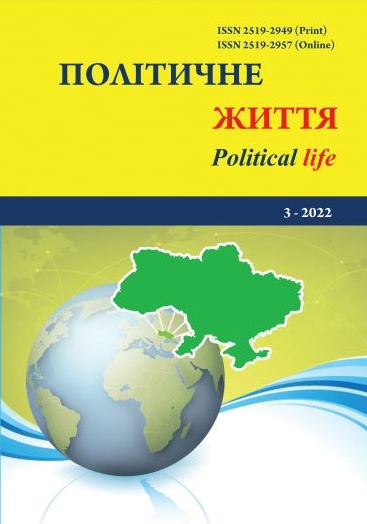The subjectlessness of the empires’ lifecycle and the prospects of the modern world order
DOI:
https://doi.org/10.31558/2519-2949.2022.3.3Keywords:
empires; world order; subjectlessness; the war in UkraineAbstract
The article reviews the lifecycle models of 15 key imperial centres over the past 800 years to highlight general evolution trends and extrapolate them to the prospects of Putin’s Russia after the start of the fullscale war in Ukraine. The analysis of past and present empires as complex non-linear systems allows the author to conclude that their paths are not rather the result of decisions and actions of individual actors (leaders, elites or macro-groups) but a subjectless sequence of cycles of prosperity and decline, which are interrupted by short periods of chaotic behaviour.
The lifecycle models of most of the considered empires have virtually the same trajectory: from the formation and consolidation of the imperial centre, the conquest of internal territories and active external expansion to the period of maximum power (prosperity) followed by internal destabilisation, competition with other imperial players and collapse. The imperial centres of Russia and China can be considered as a case study, as they have undergone several evolutionary waves, with periods of short (from a historical perspective) disintegration followed by the restoration of the imperial lifecycle. Currently, the autocratic nature of the regimes in these states does not burden their rulers with the need to consider public opinion and allows them to direct state resources towards external expansion. The author concludes that the military aggression against Ukraine (since 2014) has started another crisis phase of Russia’s lifecycle, which the Kremlin leadership mistakenly perceives as a period of imperial flourishing. The current state of the world order, also evolving within the framework of subjectles evolutionary cycles, is characterised by decentralisation, polycentricity of power, and multilevel interrelationships between key actors. Challenging this new world, the Kremlin regime is trying to act through hard power, typical of previous stages in the evolution of the imperial systems. At the same time, the overall course of the war in Ukraine demonstrates that the rigidly hierarchical Russian autocratic empire is the relict in today’s decentralised world. And it is losing to a network society that is able to mobilise resources much faster and more effectively and is much more motivated to victory.
References
Бевзюк Є. Імперія як історико – географічний феномен. Геополітика України: історія та сучасність. 2019. № 1(22). С. 45-65. DOI: https://doi.org/10.24144/2078-1431.2019.1(22).45-65
Бранский В.П. Социальная синергетика как постмодернистская философия истории. Общественные науки и современность, 1999. №6. С. 117-127.
Военные расходы в эпоху коронавируса: Россия в пятерке лидеров, Британия дышит ей в спину (26 апреля 2021). BBC news Русская служба. URL: https://www.bbc.com/russian/news-56886362 (дата звернення: 09.09.2022).
Нагорняк Т., Наталіна Н., Польовий М. Політична суб’єктність в умовах формування нового світопорядку. Політологічний вісник. 2021. №87. С.218-240. DOI: https://doi.org/10.17721/2415–88ІX.2021.87.218-240
Наталіна Н.О. Війна в Україні крізь призму безсуб’єктності політики. Політичне життя. 2022. №2. С. 23-29. DOI: https://doi.org/10.31558/2519-2949.2022.2.4
Пригожин, И., Стенгерс. И. Порядок из хаоса. Новый диалог человека с природой. М.: Прогресс, 1986. 432 с.
Шацилло К.Ф. Последние военные программы Российской империи. Вопросы истории. 1991. № 7–8. С. 224–233.
Doyle M.W. Empires. Ithaca: Cornell University Press, 1986.
Ferguson N. Empires with expiration dates. Foreign Policy (September/October 2006), pp. 46-52. URL: https://foreignpolicy.com/2009/10/14/empires-with-expiration-dates/ (accessed: 09.09.2022).
Hirsh M. Putin’s Thousand-Year War. Foreign Policy (12 March 2022). URL: https://foreignpolicy.com/2022/03/12/putins-thousand-year-war/ (accessed: 09.09.2022).
Kissinger H. Diplomacy. New Yok: Simon & Schuster,1994. 912 p.
Mackinder H. J. The Geographical Pivot of History. The Geographical Journal. 1904. №23(4). Р. 421–437. DOI: https://doi.org/10.2307/1775498
Motyl A. J. Why Empires Reemerge: Imperial Collapse and Imperial Revival in Comparative Perspective. Comparative Politics. 1999. № 31(2). P. 127–145. DOI: https://doi.org/10.2307/422141
Nye J. Soft Power: The Means to Success in World Politics. New York: Public Affairs Group, 2004. 191 p.
Tilly Ch. After empire: multiethnic societies and nation-building. The Soviet Union, and the Russian, Ottoman and Habsburg empires / Barkey K., von Hagen M. (eds.). Boulder; Oxford: Westview press, 1997. 211 p.
What Does Putin Really Want? (25 February 2022). Politico Magazine. URL: https://www.politico.com/news/magazine/2022/02/25/putin-russia-ukraine-invasion-endgame-experts-00011652 (accessed: 09.09.2022).

